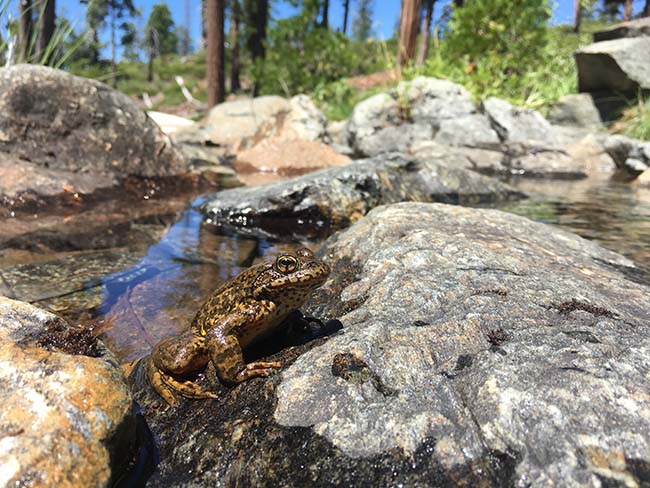On behalf of SAVE THE FROGS! and California’s critically endangered Mountain Yellow-Legged Frogs (Rana muscosa), on November 20th, 2013, SAVE THE FROGS! Founder Dr. Kerry Kriger submitted the following letter to the National Park Service. The letter is part of the Service’s official call for public comment related to its proposal to remove predatory non-native fish from 87 water bodies in Sequoia and Kings Canyon National Parks. Non-native fish eat Mountain Yellow-Legged Frogs and have been shown to be a proximate cause of their drastic population declines.
“Dear National Park Service,
I am a professional biologist with a Ph.D. in environmental science and over a decade of full-time amphibian conservation experience. Amphibian populations have been rapidly disappearing in California and worldwide and nearly one-third of the world’s amphibian species are on the verge of extinction. Up to 200 species have completely disappeared since 1979. Frogs and other amphibians face an array of threats from climate change to habitat destruction; pesticide use; over-collection for frog legs and dissections; invasive species; and infectious diseases spread by human activity. Frogs eat mosquitoes; provide us with medical advances; serve as food for birds, fish and mammals; and their tadpoles filter our drinking water. Plus frogs look and sound cool, and kids love them — so there are lots of reasons to save the frogs!
The Mountain Yellow-Legged Frogs (Rana muscosa) are among the most well-studied frogs on the planet and their drastic population declines have been well-documented by many researchers. It is extremely clear that without significant human intervention to protect this species they have a high likelihood of becoming completely extinct in the near future. As such, I support the National Park Service’s proposal to remove non-native fish from 87 water bodies in Sequoia and Kings Canyon National Parks. Non-native fish eat native frogs and have been shown to be a proximate cause of the Mountain Yellow-Legged Frogs’ rapid population declines.
I also encourage the National Park Service to increase its efforts to educate the public about the threats amphibians face and the importance of protecting remaining amphibian populations. In this regard, I am happy to work with the NPS to develop amphibian educational materials (brochures, posters, slideshows, videos) for National Park visitor centers across the country, and I am happy to give live presentations on amphibian conservation to NPS staff and park visitors.
Both American wildlife and American people as a whole will benefit significantly through the implementation of these actions. Thanks to the National Park Service for helping SAVE THE FROGS!
Kerry M. Kriger, Ph.D.
SAVE THE FROGS!
Founder, Executive Director & Ecologist
Berkeley, CA
kerry@savethefrogs.com
www.savethefrogs.com
www.savethefrogs.com/kerry-
November 20, 2013″



